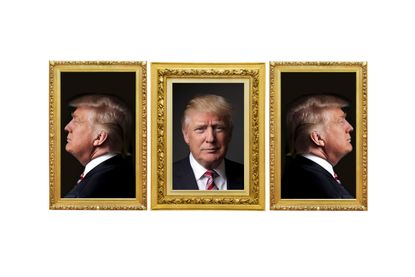Donald Trump's post-ideological authoritarianism
The only thing that's consistent about Trump is his inconsistency — a refusal to be pinned down on anything, and a propensity to state his position of the moment (whatever it is) with absolute conviction


Donald Trump's presidential campaign is so disruptive to our understanding of politics that even his many critics can't decide how to describe it.
The account most frequently heard is the one favored by many right-wing pundits (including the writers associated with National Review, blogger Erick Erickson, and Weekly Standard editor Bill Kristol): namely, that Trump is "really" a liberal. These critics are fond of circulating a couple of chummy-looking photos of Bill and Hillary Clinton at Trump's 2005 wedding to Melania Knauss, as well as quoting public statements in which Trump appears to take a more liberal position than the one we would expect from a Republican, on taxes, Planned Parenthood, and other topics.
But on each of those issues, Trump has usually taken a more staunchly conservative position at one time or another — sometimes merely a few hours or days before or after the incriminating liberal-sounding statement. And then there are those issues on which Trump stands far to the right of most mainstream Republicans: draconian immigration restrictions, forcible deportations of more than 11 million people, and a ban on Muslims entering the country.
Subscribe to The Week
Escape your echo chamber. Get the facts behind the news, plus analysis from multiple perspectives.

Sign up for The Week's Free Newsletters
From our morning news briefing to a weekly Good News Newsletter, get the best of The Week delivered directly to your inbox.
From our morning news briefing to a weekly Good News Newsletter, get the best of The Week delivered directly to your inbox.
That would make Trump a pretty unusual liberal.
Then there are the Trump critics who take the very different tack of highlighting Trump's flirtations with political violence and his most xenophobic positions — on Mexicans and Muslims — to suggest that his campaign represents the leading edge of fascism in the United States. The most recent and cogently argued case for this view was made in a recent Washington Post column by Robert Kagan, a neoconservative foreign policy analyst who switched his political allegiance to Hillary Clinton back in February.
But this view also seems a little…overstated. For one thing, fascist movements aren't usually as ideologically heterogeneous as Kagan suggests. They are unified around a collective aim or goal, and they seek to achieve that end through the complete absorption of civil society into the state — and the radical militarization of both. (Think of the ancient Greek city-state of Sparta blown up into the size of a modern nation-state, with unity enforced with modern technology of surveillance.) Trump has sometimes stoked violence at his rallies and made threatening comments against journalists. Both tendencies are quite troubling. But they don't (yet) make Trump the leader of a fascist movement.
Kagan also highlights what may be the most distinctive thing about Trump — the trait that explains how critics can somewhat plausibly describe him both as a liberal and a fascist. (And no, it's not because liberalism is actually fascism, and vice versa, as at least one conservative writer apparently believes.) This trait is Trump's deliberate inconsistency, and even outright ideological incoherence.
Most discussion of Trump's myriad shifts of position see them as evidence of his ignorance about policy, or a sign (as Erickson and others on the right contend) that Trump is really a liberal who conceals his true commitments behind a facade of conservatism.
The more ominous truth may be that Trump is beyond ideology altogether.
You might not think this is such a bad thing. Ideology can distort our vision, forcing reality to conform to pre-existing assumptions and leading us to ignore evidence that might complicate our presumptions. That's true, and one reason why thinking at its highest levels always pushes beyond ideology.
But ideology also enforces discipline and rigor. It constrains thinking and action. It's a limit to freedom of movement on the part of elected officials. When people voted for Mitt Romney, they could be pretty sure that as president he wouldn't sharply raise taxes or pull the U.S. out of NATO. How did they know these things? Because Romney is a Republican, the Republican Party has (until now at least) affirmed the ideology of the conservative movement, and the conservative movement is ideologically opposed to raising taxes and ideologically committed to muscular internationalism in foreign policy.
The same held for Barack Obama back in 2008. We didn't know the details of what he would do when he became president, especially after the scope of the financial crisis became clear in the months leading up to the election. But we knew his approach would be broadly Keynesian, involving a lot of deficit spending on the part of the federal government. We knew this because, despite a campaign that relied heavily on vacuous rhetoric about "change," Obama is a Democrat, and the liberal ideological tendencies of Democrats are well known to all.
Trump appears to be different. Yes, he's running as a Republican, but he hasn't consistently endorsed any element of the ideology that has defined the party since Ronald Reagan — not in economic policy, not in social policy, not in foreign policy. But neither has he shown himself to be a liberal ideologue seeking to blow up the nominally conservative GOP from the inside.
On the contrary, Trump has shown no ideological consistency at all — not even for a new kind of ideology I sketched in a speculative recent column. That ideology would make the GOP a party of white ethnic nationalism, combining harsh anti-immigrant policies with protectionism, tax hikes on the rich, generous social programs (at least for citizens), and a radical shift toward isolationism in foreign policy. Trump sometimes sounds like he favors something like this mix of policies. And if he ran on them, won, and tried to enact them as president, he might very well succeed in catalyzing a dramatic realignment of both parties.
But there's no reason to suppose Trump will commit himself even to this alternative matrix of policies. Every time he talks about raising taxes or the minimum wage, he then backtracks to a more standard Republican line. The same goes for foreign policy, social issues, and other topics.
The only thing that's consistent about Trump is his inconsistency — a refusal to be pinned down on anything, and a propensity to state his position of the moment (whatever it is) with absolute conviction. (When he adopts a different position the next day, he invariably states that with just as much certainty and assurance.)
This tendency on policy goes along with his contempt for formal as well as informal limits and constraints more generally. We've seen this in Trump's willingness to duck out of a scheduled primary debate, his refusal to articulate and affirm core conservative principles, and his threat not to accept the rules of delegate allocation for the Republican National Convention (back when it looked like the campaign of Ted Cruz might be outmaneuvering him).
In every case, Trump's aim is to secure absolute freedom of movement for himself. Settled traditions, norms, institutions, rules — including ideological commitments — aren't for him. What he might do in office will be impossible to discern in advance.
That's not fascism. But it is a splendid precondition for authoritarian government.
In November, the Trump campaign will be asking voters to cast a ballot not for a party or a platform but for an individual who will aim to embody our nation's will and do anything necessary to advance its interests as he discerns them from day to day, maybe even from moment to moment. In this sense, it doesn't matter that Trump is running as a Republican. He could just as easily be running as a Democrat. Not because he's a liberal. But because for Trump and the kind of authoritarian-populist politics he practices, ideology is entirely beside the point.
Sign up for Today's Best Articles in your inbox
A free daily email with the biggest news stories of the day – and the best features from TheWeek.com
Damon Linker is a senior correspondent at TheWeek.com. He is also a former contributing editor at The New Republic and the author of The Theocons and The Religious Test.
-
 'The disconnect between actual health care and the insurance model is widening'
'The disconnect between actual health care and the insurance model is widening'Instant Opinion Opinion, comment and editorials of the day
By Anya Jaremko-Greenwold, The Week US Published
-
 Cautious optimism surrounds plans for the world's first nuclear fusion power plant
Cautious optimism surrounds plans for the world's first nuclear fusion power plantTalking Point Some in the industry feel that the plant will face many challenges
By Justin Klawans, The Week US Published
-
 Explore new worlds this winter at these 6 enlightening museum exhibitions
Explore new worlds this winter at these 6 enlightening museum exhibitionsThe Week Recommends Discover the estrados of Spain and the connection between art and chess in various African countries
By Catherine Garcia, The Week US Published
-
 US election: who the billionaires are backing
US election: who the billionaires are backingThe Explainer More have endorsed Kamala Harris than Donald Trump, but among the 'ultra-rich' the split is more even
By Harriet Marsden, The Week UK Published
-
 US election: where things stand with one week to go
US election: where things stand with one week to goThe Explainer Harris' lead in the polls has been narrowing in Trump's favour, but her campaign remains 'cautiously optimistic'
By Harriet Marsden, The Week UK Published
-
 Is Trump okay?
Is Trump okay?Today's Big Question Former president's mental fitness and alleged cognitive decline firmly back in the spotlight after 'bizarre' town hall event
By Harriet Marsden, The Week UK Published
-
 The life and times of Kamala Harris
The life and times of Kamala HarrisThe Explainer The vice-president is narrowly leading the race to become the next US president. How did she get to where she is now?
By The Week UK Published
-
 Will 'weirdly civil' VP debate move dial in US election?
Will 'weirdly civil' VP debate move dial in US election?Today's Big Question 'Diametrically opposed' candidates showed 'a lot of commonality' on some issues, but offered competing visions for America's future and democracy
By Harriet Marsden, The Week UK Published
-
 1 of 6 'Trump Train' drivers liable in Biden bus blockade
1 of 6 'Trump Train' drivers liable in Biden bus blockadeSpeed Read Only one of the accused was found liable in the case concerning the deliberate slowing of a 2020 Biden campaign bus
By Peter Weber, The Week US Published
-
 How could J.D. Vance impact the special relationship?
How could J.D. Vance impact the special relationship?Today's Big Question Trump's hawkish pick for VP said UK is the first 'truly Islamist country' with a nuclear weapon
By Harriet Marsden, The Week UK Published
-
 Biden, Trump urge calm after assassination attempt
Biden, Trump urge calm after assassination attemptSpeed Reads A 20-year-old gunman grazed Trump's ear and fatally shot a rally attendee on Saturday
By Peter Weber, The Week US Published